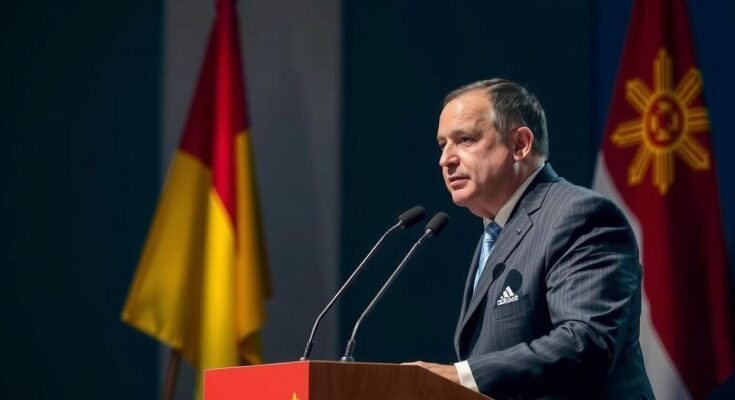Moldova’s second round of presidential elections looms, with President Maia Sandu facing challenger Alexandr Stoianoglo. Sandu, seeking reelection, emphasizes European ties amidst Russian influence and allegations of vote-buying linked to Kremlin proxies. The election outcome is deemed crucial for Moldova’s democratic integrity and European aspirations.
Moldova is currently facing a pivotal moment as the nation prepares for the second round of its presidential election, which has significant implications for its orientation towards Europe and Russia. Maia Sandu, the incumbent pro-Western president, is seeking reelection following her efforts to strengthen ties with the European Union amidst the backdrop of the ongoing war in Ukraine. In the first round of voting, held concurrently with a referendum on EU membership that narrowly passed, President Sandu garnered 42% of the vote. However, both events were overshadowed by a substantial vote-buying scheme allegedly orchestrated by the Kremlin, which Sandu characterized as an “unprecedented assault” on Moldova’s democratic processes. Sandu’s main opponent, Alexandr Stoianoglo, who previously served as prosecutor general and represents the pro-Russian Party of Socialists, received over 26% of the initial vote despite early polling indicating a support level of just over 10%. The prospect of Stoianoglo receiving additional backing from other Kremlin-aligned groups raises concerns about the potential closeness of the final vote. During the recent debates, Sandu labeled Stoianoglo as a “Trojan Horse” for Russian interests in Chisinau. Experts assert that this election is a crucial test for Moldovan democracy, as Valeriu Pasha from WatchDog.MD warned that the outcome relies on the integrity of the voting process against the influence of “Russian dirty money.” He highlighted the risks posed by oligarch Ilan Shor, who allegedly financed efforts to sway the election in favor of a pro-Russian candidate, targeting an estimated 10% of the electorate. While analysts critique the overall discontent during Sandu’s first term, marked by challenges such as the COVID-19 pandemic and the energy crisis caused by the war, many question her handling of governance amid these crises. In particular, her decision to hold the referendum alongside the presidential election was perceived as a strategic misstep. This simultaneous approach seemed intended to bolster support for her EU integration agenda, yet it may have backfired by amplifying existing voter dissatisfaction. Stoianoglo appears to be tapping into this discontent while simultaneously proposing a dual approach to relations with both Moscow and Brussels, promoting a controversial stance of engagement with Russia while advocating EU membership. As Moldovans prepare for a possible repeat of abusive election practices, the stakes of the upcoming vote could solidify or undermine the country’s aspirations for a European future. A government aligned with Russia may complicate relations in the region, particularly concerning Transnistria, a breakaway territory harboring Russian military presence. The implications of this election extend beyond Moldova’s borders, paralleling recent events in Georgia, where the Kremlin’s influence remains a pressing issue. The results of Moldova’s election this Sunday will thus serve as a critical indicator of the geopolitical struggle playing out in Eastern Europe.
The article discusses the upcoming second round of the presidential election in Moldova, a country caught between European integration and Russian influence. Maia Sandu, the incumbent president, represents the pro-European sentiment, while her opponent, Alexandr Stoianoglo, reflects pro-Russian interests. The context includes a broader concern about foreign interference in democratic processes and the long-standing issues of corruption and oligarchic influence in Moldova. Furthermore, the situation is compounded by Moldova’s geopolitical significance amid the war in Ukraine and the historical context of Russian intervention in former Soviet states.
In summary, Moldova’s upcoming presidential election serves as a critical juncture for the nation, with vast implications for its democratic integrity and alignment with Europe or Russia. Amid allegations of foreign interference and domestic dissatisfaction with governance, the election outcome will significantly shape Moldova’s immediate future and its relationship within the broader regional context. The stakes are high, as a shift towards a pro-Russian administration may jeopardize Moldova’s aspirations for European integration and democratic governance.
Original Source: www.cnn.com




